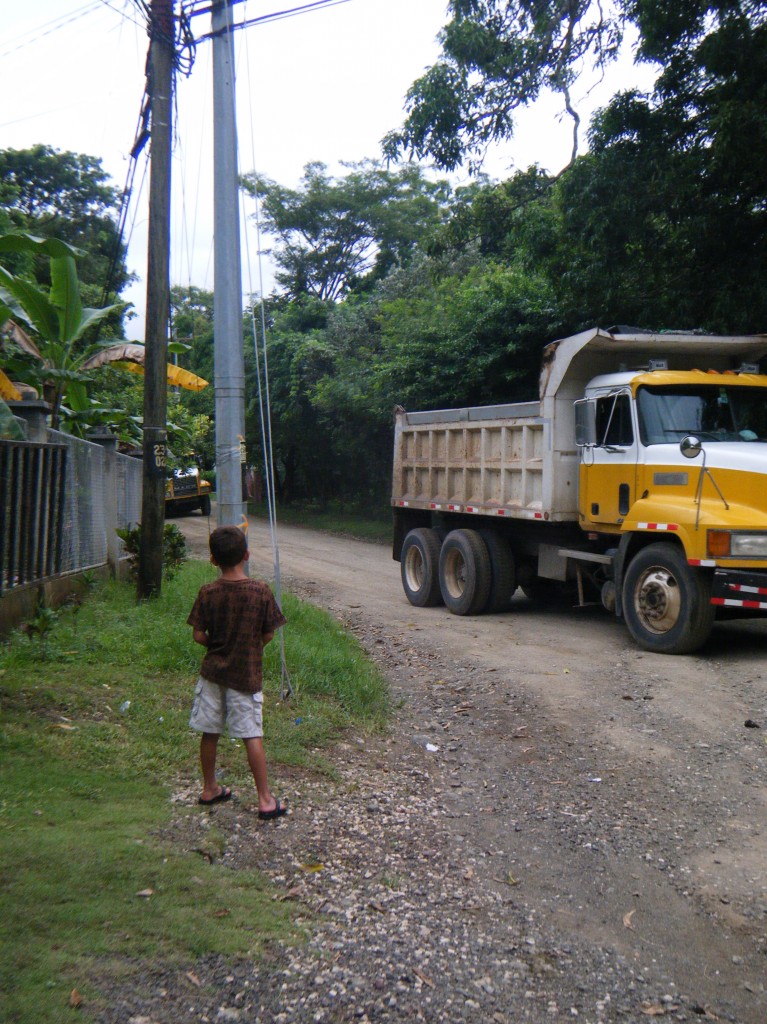
What would certainly piss off your average tourist has turned out to be one of the greatest homeschooling lesson opportunities we’ve had all year:
What is infrastructure?
One definition I found online is:
Infrastructure: The basic physical systems of a country’s or community’s population, including roads, utilities, water, sewage, etc. These systems are considered essential for enabling productivity in the economy. Developing infrastructure often requires large initial investment, but the economies of scale tend to be significant.
How to explain this to my kids?
The roads are unpaved, and sometimes frighteningly narrow. Try sitting on a bus barreling down the road—even an old Mercedes bus—and feel how your heart leaps into your throat at the sight of another speeding bus coming in the other direction. Will there be room? Will there? You are at the mercy of fate. You are at the mercy of the viscosity of mud.
It kind of makes orange barrel season not seem so bad.
You sleep in the heat and humidity, a ceiling fan swirling the air around you as you kick off the rest of your thin sheet. It’s the middle of the night in Costa Rica. Suddenly, an electrical box on the street explodes with a big bang. The fan slows its whizzing, and stops. You lie there, wondering. Two hours later, in pouring rain, another explosion, this time one with what sounds like fireworks. You fumble for a flashlight. Did you put your crank-up one right by the bed for such an eventuality? No, you did not; it’s buried somewhere in your suitcase with the ESL materials. Damn it.
In the morning, there is no running water, either. Your toilet quickly becomes latrine-like.
There is no way of knowing who will come to fix all this, or when.
The boys ask, “Why did all of this happen?”
That’s lesson 1 on infrastructure.
Suddenly, they remember the electric company people in hardhats up north, all those folks climbing poles, checking wires. The fellow who came by to read the electric meter. We pay for power services, you tell the kids. We pay each month, and part of what we pay goes for emergency repairs, so that we don’t have to go without power.
You talk revenue. Here, in this village, the revenues for power are not as great as in a country like the U.S., so the emergency electrical services are much slower to respond. Here, in this village, there is no company office——it’s very far away, over less than adequate roads. So they won’t just zip over here like you think they would.
Now about the water.
“A main pipe may have burst somewhere,” you say. “Or perhaps the water has been shut off for preventative maintenance somewhere along the line.”
“But why wouldn’t they let us know ahead of time? We could have taken a shower.”
“Yes.”
Infrastructure is not only the fixit people, the preventative fixit people, and the road crews who someday will get the blessing from the bureaucrats to pave these roads. Infrastructure, above all, is communication.
And without power to our TV or radio, without putting signs up, holding informative meetings, or having a thorough and reliable postal system, communication can’t happen all that well.
“Just pretend we’re camping in the High Sierras,” I tell the boys. We eat cold leftover rice, drink water from the bottles that we’re lucky to have at home, and go without showering.
“And stay away from those telephone poles and wires in this rain,” I caution.
When the water and power are finally back on, and the toilet its old self again, I say: “Someday this might be YOUR job, your responsibility, to make sure water is available and safe, the electricity is available and safe, and the roads are reliable and kept up.”
“Yeah,” my son says, looking around our apartment and then out the window at the muddy road. “It’s important.”


General, Homeschooling, International, Roadschooling